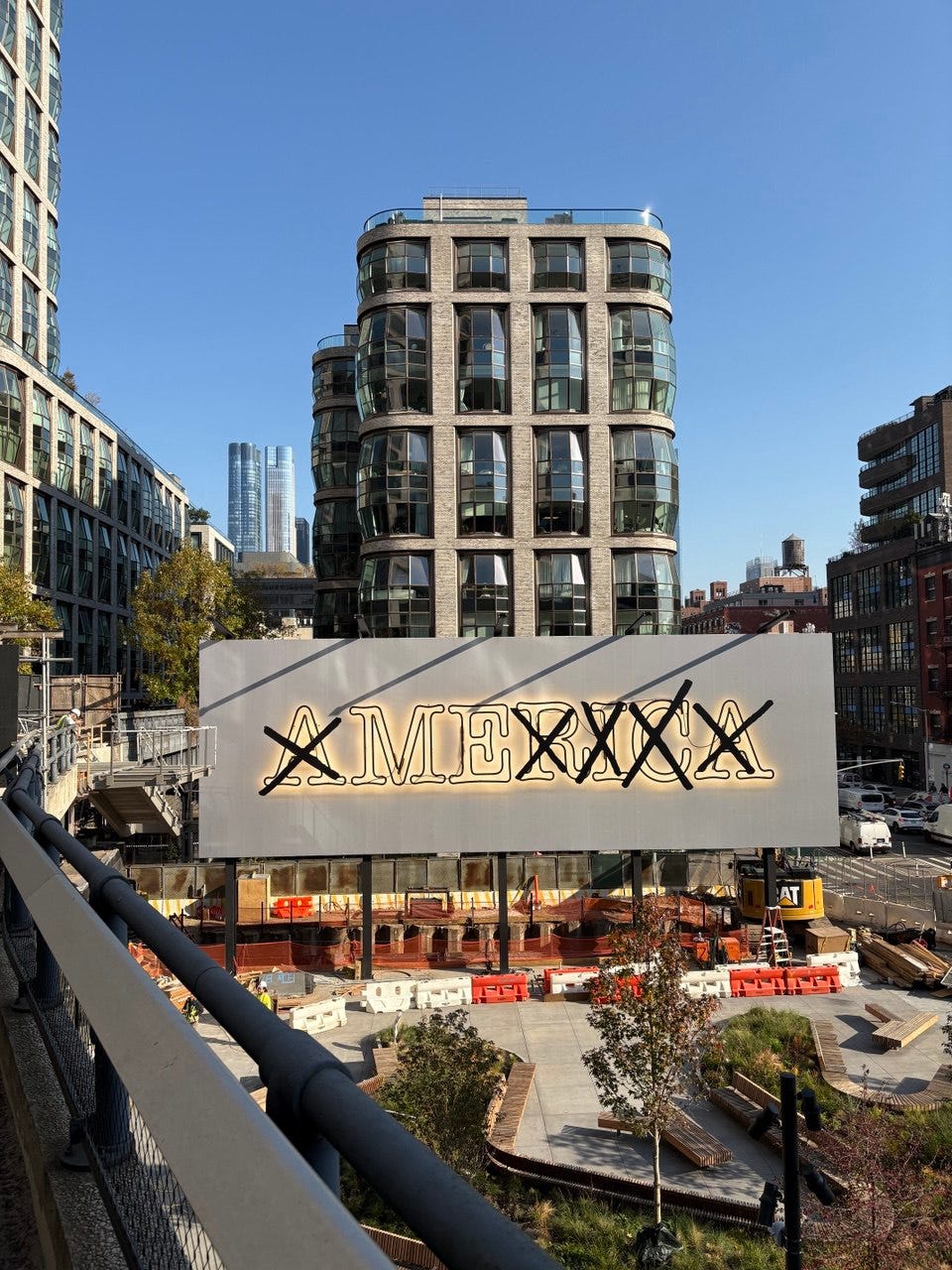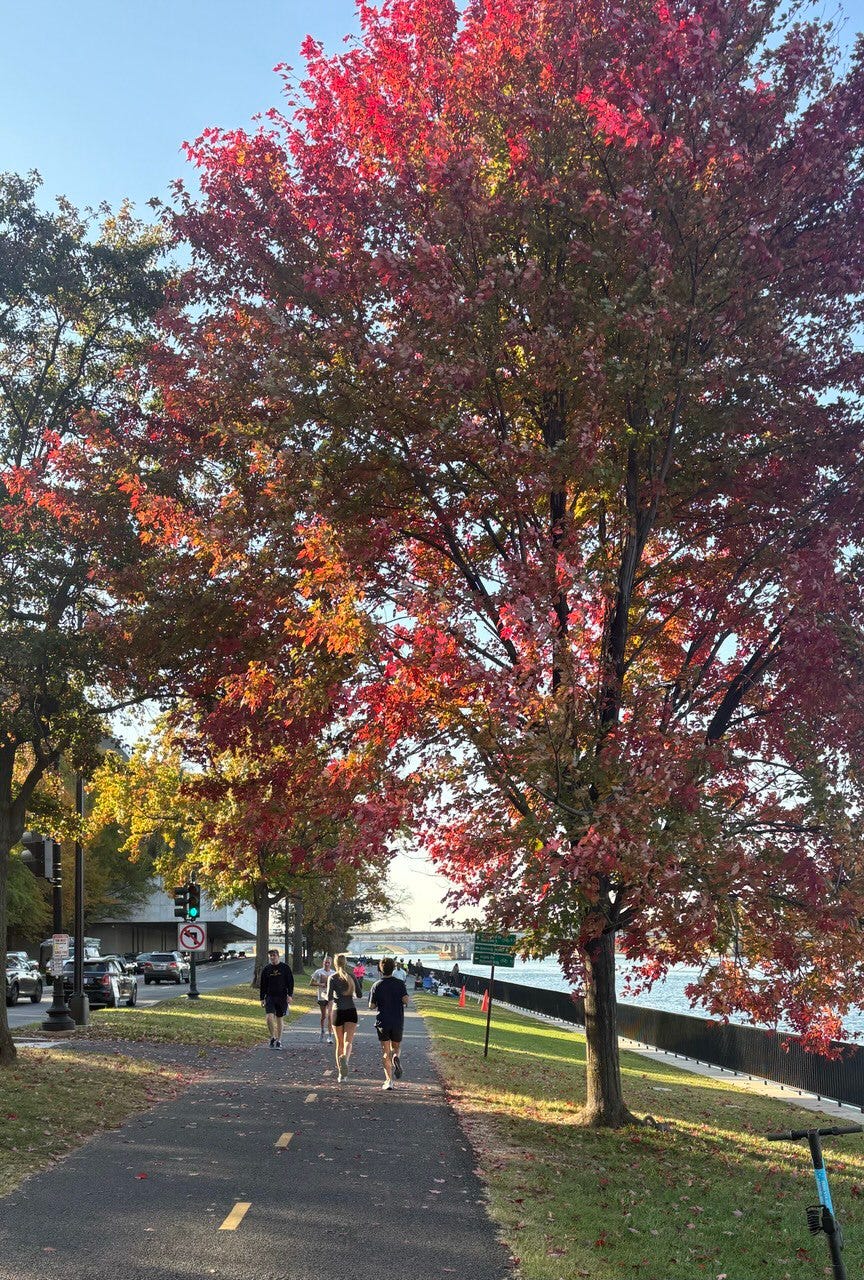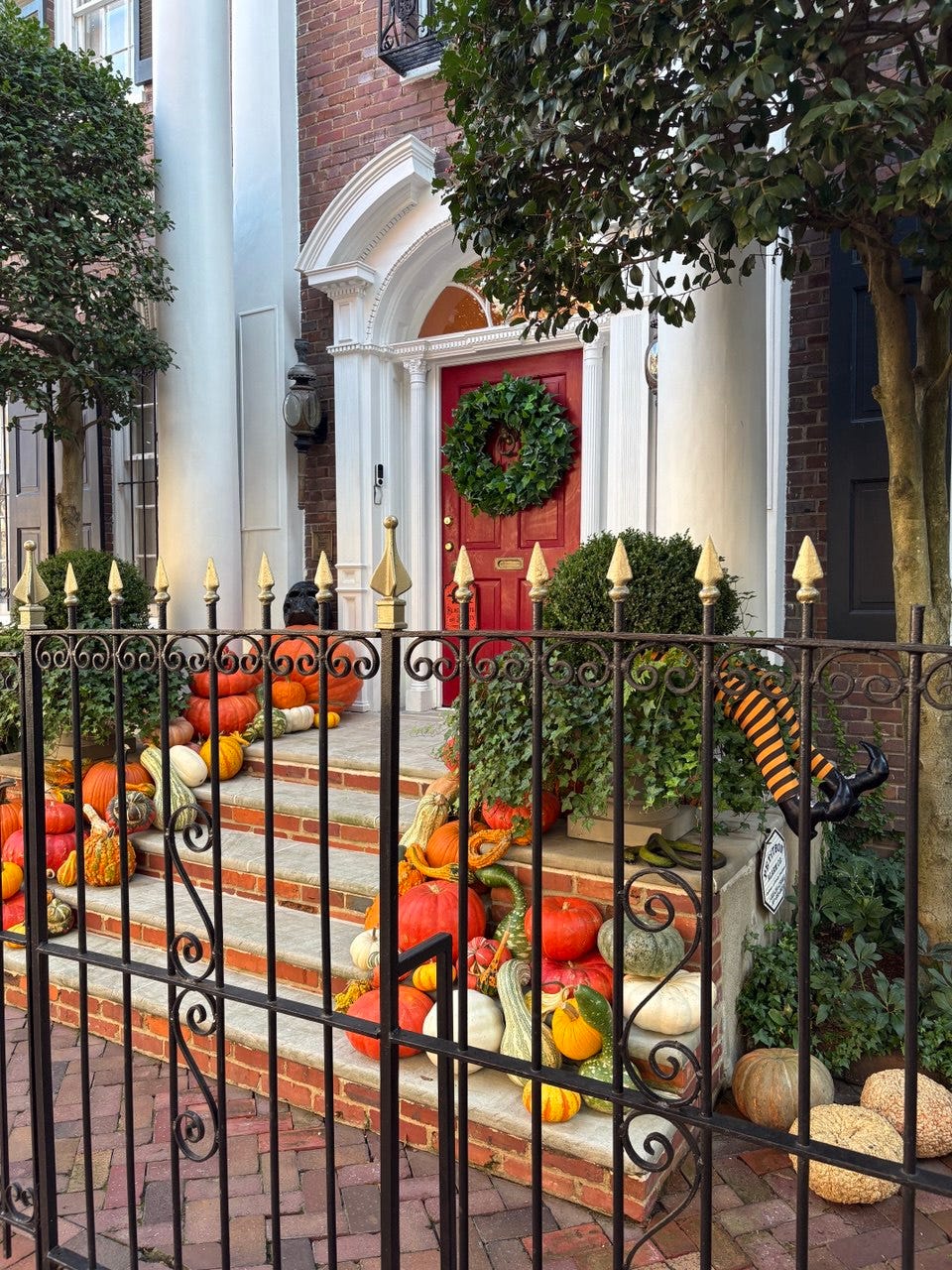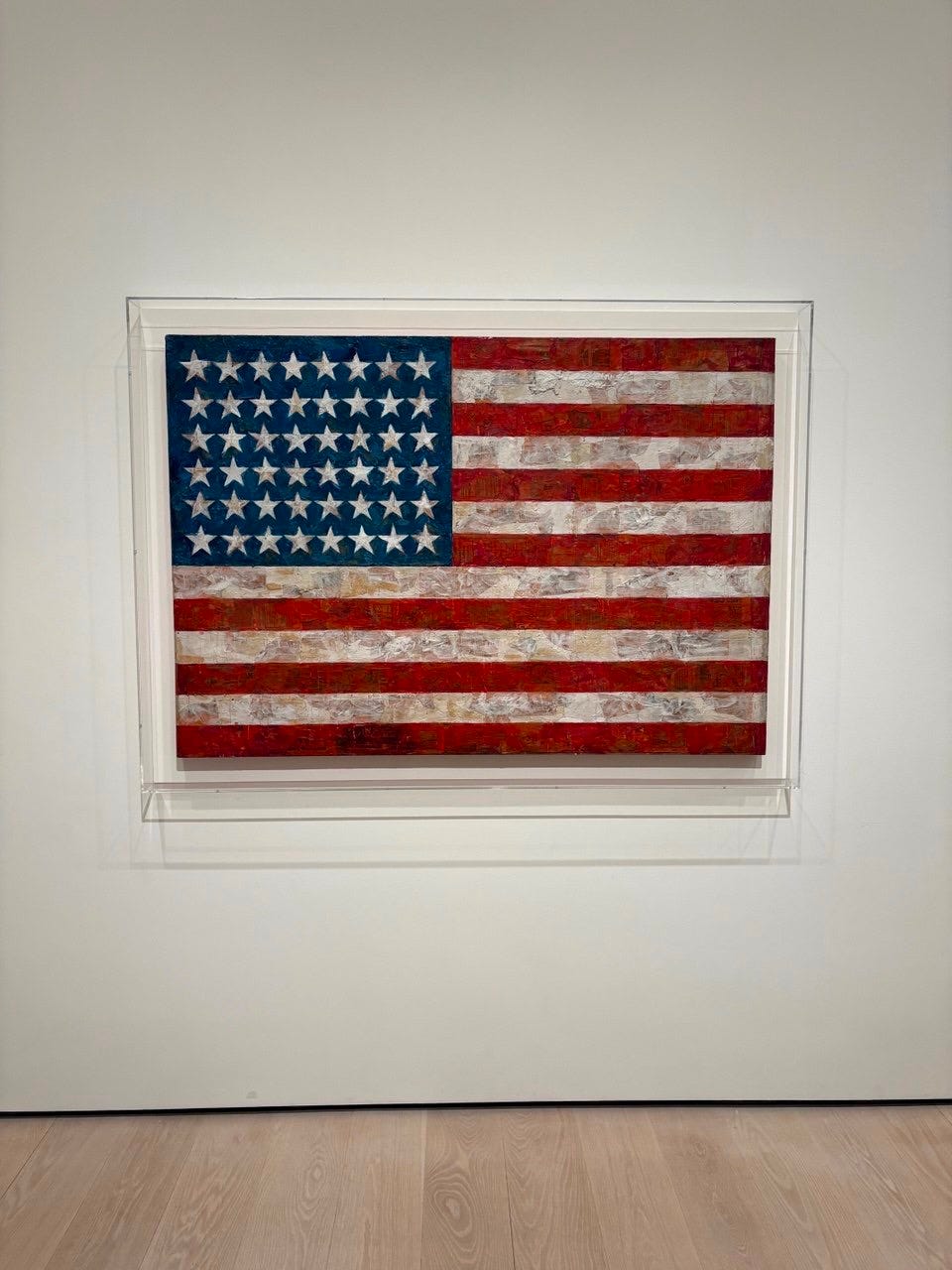
America
Apologies for the long absence -- have been travelling, a lot. Some personal observations after nearly a week in Washington DC and New York. Plus a wonderful book & movie recs.
Apologies that it has been ages since I last wrote. I was travelling, twice, first to Montenegro (will write on that later as it is not time sensitive), and most recently to the U.S. to visit my eldest who is in his freshman year of college there.
It is an odd thing to return home to America as an American but feel like an alien. As the years go by since I left in 1999, and the differences between Europe and America increase in number, each time I go “home” I feel less and less like I understand the place. I mean, fundamentally, of course, I understand America as a concept, having been educated by public schools back when they still more or less worked and private schools weren’t a status symbol for the wealthy. I have a 1980s imprint of America in my head: you say the pledge of allegiance, you believe in equal opportunity for all, that capitalism solves real world problems, democracy in action really works, and the American dream is a real possibility if you just work hard and smart enough. I was educated and started working in the 1990s when it was possible as a first generation immigrant kid to be accepted to a top university, paying for it didn't mean your parents had to automatically drain their bank account, and you could still land a good job after college with decent grades and without hardcore nepotism. I now, frankly, question a lot of those premises.
Here in Europe, I get frustrated with socialism in action, as I see it rewarding people for not doing things, for not working, for not trying harder, for having more children than they can feed. But what I often forget about, sitting here in Europe, is what it looks like when late stage capitalism exists to foster the further success of an already insanely rich group of people, basically to the detriment of everyone else. Or is that the history of our planet in a nutshell? Perhaps it was always this way, for centuries, and the blip in the post-war era of prosperity for all was just that — a blip. Experiments with communism failed, and America’s experiment with capitalism on drugs certainly doesn’t seem to be failing: people are gainfully employed and spending money. I just question the quality of life they are left with. And I suppose, we each have our own individual definitions of said quality of life. For some, it is car ownership. For others, like many in Vienna, it is access to affordable, reliable public transportation. I now genuinely do not feel I need to own a car, I assure myself I am saving money by not owning one, and I do not really feel as if my quality of life suffers as a result of being carless. In the U.S., that is almost unthinkable. So you see Cybertrucks and six figure price tag SUVs next to absolute rusty bangers from the 90s because people with minimum wage jobs have to get around somehow too.
It definitely feels as if the middle class has somehow evaporated, at least from the coasts. Let me preface my generalisations (going to be a lot of them) by saying that I was staying in two of the most expensive areas of the country: Washington DC and New York, more precisely, in Georgetown and near Wall Street. My sticker shock began with a simple trip to CVS when I needed to buy toothpaste that first night, and there were no “no label” brands, only leading brands, starting around $6 for a tiny tube of paste. More expensive products, like razors and the like, are now locked behind plexiglass and you have to ring a bell to ask an employee to open you the case. I wonder (I did not check this) if you have to do the same for buying condoms.
These urban areas catering to the wealth are also now near grocery store deserts. I suppose the real estate prices are such that you can only make money selling $7 iced coffees (we were three and every time we bought three drinks it was basically twenty bucks no matter where we went) and $8 ice cream scoops, or offering services like one shop I noticed in lower Manhattan “sugared & bronzed”. If you know you know. I kept telling myself all services must wait until I get back to Vienna and can visit salons now employing Ukrainians here, for significantly less money and arguably far better quality.
The first evening I offered to take a few of my eldest’s friends to dinner, and, being tired from travelling and all, agreed to a restaurant within walking distance of our hotel. The streets were packed on this Friday night with enormous, American-made SUVs with drivers driving VIPs to their dinner dates. The Lincoln Towncar has been replaced by Suburbans with deep black tinted windows which now take up entire streets. It is, frankly, a disturbing sight. The “French” restaurant was overpriced, run like a factory, overstaffed — clearly with a pecking order, those carrying plates all non-white, many immigrants, your “waiter” acts like from a different species, talks down to you as if she is doing you a favour by placing your order. You try and order smart, only entrees, no starters, no dessert, one bottle of wine (and yes, the freshmen did have to produce their fake IDs which did pass the test), and the bill comes to a whopping $300 I am pretty sure of which she added in tip automatically because party of six.
It was shocking.
The whole experience. I thought of what you can eat and how you will be treated in Vienna or Paris or wherever in Europe for €300 and my heart sank. And no one would dare ask young men for an ID to have a sip of cheap Sauvignon blanc.
I was impressed by the college students across the board in their poise. Only 18 or 19, they speak like full-fledged adults. But they are not. They are excited to vote for the first time. They are split right down the middle when you ask them about who they think will win the election. They are open about sexuality and everything else. I went to college during a time when I don’t remember a lot of openly gay fellow students. This has all changed, impressively so. And yet I wonder if they are going to graduate into a society in which their opportunities will be determined by their parents’ wealth and who their parents know, even more so than in my generation. I joined the workforce with other immigrant kids, women, who were not connected. I wonder if that still happens. I somehow doubt it. I hope I am wrong. Or they hire women and students of color for statistics (they did this in my day too, of course), and then you just don’t get promoted. I wonder how much is rigged behind the scenes. I didn’t have this scepticism as a college student. As a college parent, I really question a lot of the marketing. If you think about something as “simple” as becoming a doctor, only the child of doctors’ can afford to pay for all that education required to get there in America. In Europe, your parents don’t have a heart attack when you say you want to go to medical school.
These young kids are pre-professional in a way we were not as seniors. We flew to New York for interviews asking each other what an investment bank even does. They knew this in high school. I am not sure what to make of that. I think, more than anything, it makes me sad, to think everything is so pre-programmed, that everything revolves around money. But it is understandable, when you look around and see the gaps in society. You see so clearly how services thrive which make life easier for those who have it, and how many people are employed in making the lives of the rich more comfortable. You also see the astounding gaps, like in infrastructure, public transport, because funding those things isn’t a fun fin-tech start-up idea, they require boring taxpayer money to be spent, and the rich find ways around it anyway. They don’t care what the terminal in the airport looks like because they fly private. They don’t care about overcrowded highways and tunnels which look like they haven’t had a renovation in decades because there are helicopters taking off every thirty seconds from the launchpad by Wall Street. They live their lives, quite literally, by bypassing those things “normal” people need to use, at every opportunity. And this ruling class, if we may call them that, they are not small in number. And it is their billions that are funding these election campaigns.
We watched a few Yankees games (they lost the World Series in game 5 to the Dodgers) on the TV. My youngest was fascinated by this (albeit, admittedly rather boring) sport she had never seen. The only commercials are political attack ads (and they can be nasty) and for pharmaceutical products most of us have never heard of. The streets of Manhattan (and DC, to a lesser extent) smell everywhere of marijuana. No cigarette smoke, though. Doggy day care is an actual thing, and there are a lot of pups whose owners cannot or do not want to leave them alone for the day while they are at work. We saw one “salon” dressing up the dogs for a photo shoot on Halloween. We paused to admire the Dalmatian dressed as a fireman. The dogs are not the only ones dressing up. The wealthy dress up their homes for every holiday, probably not by themselves. The multi-coloured and -sized pumpkin displays were all so perfectly arranged, the over-sized skeletons and spiders so perfectly hung, that one can only pause to admire the entrepreneur who got into that service business. I wondered to myself how much it costs to “do” your steps and front garden for Halloween. How many zeroes? Does it matter? Do kids even live in the neighbourhood to go trick-or-treating? Do they come as a destination? It left me uneasy, with so many questions.
We took the Amtrak from DC to NYC which was fine, totally uneventful in the context of European train travel. The seats were comfortable. The cafe actually had fresh fruit in a cup and my older daughter almost cried. It is easier to order an oat milk matcha latte in DC than to buy a single banana or apple. Which makes sense, because, late stage capitalism, margins. I think about margins a lot as I think about modern America. But out the train window, the view was bleak. Very bleak. You see the neighbourhoods abandoned, boarded up to poverty and drugs, industries and jobs which no longer exist, just streets of rust and brick and junkyards, and yet people live on them, those who cannot afford to live elsewhere. That is their America. They too will vote, at least I hope they will. But I would understand if they don’t. Because there is such an immeasurable gap between their lived reality and the promises politicians make for the TV cameras. What American dream when you look out those windows. The tents. There are tents near highway overpasses, everywhere you find an unclaimed strip of grass, there is a tent, and a homeless person who lives in it. It has become the new normal so much so that I don’t think most Americans even stop to think about it. This problem is surely much worse out west, where the weather is warmer. So much so that some communities are now trying to make being homeless illegal, e.g. you cannot sleep in public spaces.
In DC, we watched runners compete in a 50km race sponsored by the Marine Corp. These over-trained young men and women, of all shapes and sizes, decided, apparently, that the 42km of an ordinary marathon wasn’t enough. It was incredible to bear witness to the speed with which they raced past us, pounding the asphalt in special gear, as if training for this is their only job. But it is not, as I explained to my kids, that to be able to complete in a race like this, you have to have a good day job, because training and equipment and nutrition is an expensive endeavour. Friends and family lined the streets, cheering on with signs like “we can call you an Uber”. Marines, actual Marines, stood by, guarding the crowds and cheered. A DJ played loud music along the early morning race course. It was all rather overwhelming. I cynically could not stop myself from wondering what could be achieved if all that energy could be put into something less selfish and pointless than running 50km on asphalt on a Sunday morning. What if we all did something self-less together. But that would not be human nature. And you wouldn’t get a finishers’ medal.
Later that day, I almost cried when a restaurant told us there was only Sunday brunch at a fixed price, no a la carte options, as my efforts to save money went out the window. I sighed and told my kids to eat up. It was delicious and I felt badly for having panicked about the sticker. The place was full, and Americans of all sorts were enjoying a beautiful weekend early afternoon. People are spending money, but perhaps not every day, and you have to do so wisely or you will be fucked. Literally. And yes, many Americans have credit card debt and this you do not see across the packed room of a restaurant serving Sunday brunch before the NFL game gets started.
That morning we visited the new National Museum of African American Culture and History. Exceptionally well done, interactive, and huge, you almost need a few days or at least several hours to see everything. The history of black America is a testament to the fact that despite all the challenges, in the long run, things can and do move in the right direction. At least it feels like that, when you look at the progress made over the past century. On our way there, we passed the White House, already partially gated off, as grandstands are being built for the Inauguration in January. It was funny to see construction underway despite us not knowing yet who will be inaugurated. It gave me a sort of hope in institutions. If you stop and think about it, everyone is in such a panic of what will happen if “trump” wins or “kamala” wins but actually, Biden is still president, we barely hear from him, and the whole machine keeps running. I wonder if ordinary Americans at this point feel like it doesn’t really matter who is in the White House in terms of the impact on their own lives. And then you read a story like this from Texas and you feel like you cannot breathe. Do rich people in red states have a solution for this if it happens to their own daughters? Private jet to California?
I guess the real question is how much do the ruling class (by this I mean the junction of wealth and power) care about how everyone else is doing. I don’t have a good feel for this. I do feel like the disconnect is now so large that I wonder how many people think about how others are doing. America rewards you for thinking about yourself, and how to make money off of others. But yet you see over social media how people connect with relatable content, the lives of ordinary people, and this actually creates pay checks for many content creators, because the market is so large. If you are a successful TikToker in America, you can live on that. With young women now in many areas out-earning young men, it is no wonder that dating culture is messed up. I listened recently to a podcast explaining why a lot of young men will vote for Trump, because they don’t find their place in a modern, service-oriented economy which doesn’t offer non-academic boys many paths forward.
You cannot earn with your hands and muscles to feed a family like you once could.
Our last day in New York was so unseasonably warm it was unsettling. Two finance bros past us, dressed in Patagonia fleeces they didn’t need, as if they stepped out of a caricature, and one said to the other “I’m no liberal but this global warming stuff is real.”
I rolled my eyes.
On the plane back I read a sequel to a book I bought years ago, and this time, I thought the sequel was so much better than the first book. If you are a woman who went to college in the 1990s, I really recommend Either/Or by Elif Batuman.
Last night, already back in Vienna, I saw an incredible film by American writer/director Sean Baker (you may remember him from The Florida Project and Red Rocket, both films I discovered thanks to the Viennale). Anora does an amazing job of portraying Russians with nuance, something Americans are so rarely capable of. I don’t want to write to much to spoil the experience, but it is really enjoyable and well worth your time! My non-Russian speaking friend and I walked out really grateful for having seen the film in theater.
I won’t dare make any predictions about Tuesday night, other than to say we may not know on Tuesday night. The counting may go on if there are close calls and contested states. All the conspiracy theorists who no longer believe in a fair vote — they don’t help either. Early voting is already underway in cities like New York. Now that I am back in Europe, I wonder if we place too much weight on the American election. No matter what happens, America is still a long way away, and focused on its own issues. We have the war in Ukraine, now with the participation of North Korean troops, in our backyard. We have our own newly-elected politicians hosting Orban like an honoured guest, and we don’t see Putin getting ready to “retire” anytime soon.
I think the sooner Europe realises it is on its own, more now than ever, the better. I would not be able to justify to the average American why they should care about Ukraine or Gaza. The geography of America is such that she stands more or less alone. They are concerned with their own border. This makes sense. I see European intellectuals often moaning about what happens if Trump gets another term, but I think it is a false security blanket for the EU to think it needs America. I understand historical context, but really, you need to look 2024 in the eye for what it is and how things are now, not what they once were. The gap between America and Europe feels further than ever, and you can pick your poison, but I don’t think they have to necessarily move in unison. Our societies are simply not focused on the same issues and concerns. Perhaps politics are now more local than ever.



















Dear Tanja!
thank you very much for your report and your observations. Very, very interesting again!
(I have had it translated for my family - DeepL).
But I have to disagree with you on one point. Or maybe I didn't understand you correctly?
You write: “Here in Europe, I get frustrated with socialism in action, as I see it rewarding people for not doing things, for not working, for not trying harder, for having more children than they can feed.”
Do you mean unemployed people with “not working”?
In my opinion, unemployment benefit is a hard-fought legal entitlement from the times when capitalism was gaining strength.
“In July 1927, the Reichstag passed the law on the introduction of state unemployment insurance by an overwhelming majority. The compulsory insurance was to replace the unemployment benefits provided by the municipalities. For the first time, blue- and white-collar workers had a legal right to unemployment benefits, ...” from: https://www.dhm.de/lemo/kapitel/weimarer-republik/innenpolitik/arbeitslosenversicherung-1927
And having more children than you can feed has nothing to do with socialism either. Look at Africa & India.
Not everything that is not “hard core capitalism” equals socialism ;-)
But apart from that, I can understand your thoughts and feelings very well. Thank you very much for the time and effort you have given to us.
LG Regina
P.S. We'll go to see the movie :-)
Great piece. I moved to California from the UK in 1993 and your observations are spot-on. As a recent blog headline read, we are now in the 44th year of the Reagan era, and the wealth gap gets wider every year. Back in ‘93 it didn’t seem anywhere near as bad.
Yes, the middle class is slowly being eroded away. College tuition can be absurdly expensive (although some places, such as the University of California, are still within reach of the middle class); health care is absurdly expensive, and elderly care is eye-watering. A local nursing home charges a quarter of a million dollars per year per resident and is full.
Other random comments:
- In Manhattan, the affluence of the neighborhood is inversely proportional to the smell of weed on the street.
- We can only hope that trump has frightened so many women that they vote in Harris.